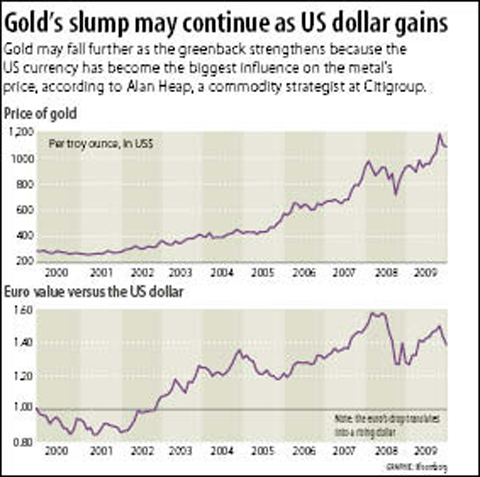Commodity prices slumped this week as confidence in the global economy was shaken by growing fears about soaring European debt and weaker-than-expected US jobs data.
“Commodity markets continue to be held hostage by volatile external markets, dollar fluctuations, shaky sentiment and changing perceptions on the health of the macro-economy,” Barclays Capital analyst Sudakshina Unnikrishnan said.
OIL: World oil prices tumbled as traders took their cue from sliding global stock markets, a stronger US dollar and mounting concerns about a potential sovereign debt default in Europe.

“The price of oil fell ... as traders continued to flee the euro and buy up the US dollar,” ODL Securities analyst Marius Paun said.
“Given the inverse relationship between the dollar and oil, this added some downside pressure but the big story remains the health of the Greek economy. Concerns over sovereign debt have pushed global equity markets lower, which in turn has dented investor confidence in terms of future demand,” Paun added.
The market had nosedived by nearly US$4 on Thursday, mirroring plunging global stock markets, as the US dollar strengthened after a surprise rise in US initial weekly jobless and a deepening debt crisis in Europe.
A stronger US unit makes dollar-priced crude oil more expensive for buyers using weaker currencies — which in turn tends to dent demand and in turn prices.
By late on Friday, New York’s main futures contract, light sweet crude for delivery in March, sank to US$72.80 a barrel from US$74.30 a week earlier.
London’s Brent North Sea crude for March fell to US$71.44 from US$72.84.
PRECIOUS METALS: The US dollar “put downside pressure on gold given the inverse relationship it has with the currency,” ODL Securities analysts said in a research note.
By Friday on the London Bullion Market, gold fell to US$1,058 an ounce from US$1,078.50 the previous week.
Silver dropped to US$15.17 an ounce from US$16.29.
On the London Platinum and Palladium Market, platinum slid to US$1,475 an ounce from US$1,512.
Palladium slipped to US$395 an ounce from US$419.
BASE METALS: Base metals prices “were thrashed again, as a surging dollar and weak US equity prices continue to weigh,” MF Global analyst Edward Meir said. “However, it is the lingering concern about how deeply and quickly China will move on tightening credit that has generated the most angst.”
By Friday on the London Metal Exchange, copper for delivery in three months dropped to US$6,335 a tonne from US$6,820 the previous week.

MORE VISITORS: The Tourism Administration said that it is seeing positive prospects in its efforts to expand the tourism market in North America and Europe Taiwan has been ranked as the cheapest place in the world to travel to this year, based on a list recommended by NerdWallet. The San Francisco-based personal finance company said that Taiwan topped the list of 16 nations it chose for budget travelers because US tourists do not need visas and travelers can easily have a good meal for less than US$10. A bus ride in Taipei costs just under US$0.50, while subway rides start at US$0.60, the firm said, adding that public transportation in Taiwan is easy to navigate. The firm also called Taiwan a “food lover’s paradise,” citing inexpensive breakfast stalls

TRADE: A mandatory declaration of origin for manufactured goods bound for the US is to take effect on May 7 to block China from exploiting Taiwan’s trade channels All products manufactured in Taiwan and exported to the US must include a signed declaration of origin starting on May 7, the Bureau of Foreign Trade announced yesterday. US President Donald Trump on April 2 imposed a 32 percent tariff on imports from Taiwan, but one week later announced a 90-day pause on its implementation. However, a universal 10 percent tariff was immediately applied to most imports from around the world. On April 12, the Trump administration further exempted computers, smartphones and semiconductors from the new tariffs. In response, President William Lai’s (賴清德) administration has introduced a series of countermeasures to support affected

CROSS-STRAIT: The vast majority of Taiwanese support maintaining the ‘status quo,’ while concern is rising about Beijing’s influence operations More than eight out of 10 Taiwanese reject Beijing’s “one country, two systems” framework for cross-strait relations, according to a survey released by the Mainland Affairs Council (MAC) on Thursday. The MAC’s latest quarterly survey found that 84.4 percent of respondents opposed Beijing’s “one country, two systems” formula for handling cross-strait relations — a figure consistent with past polling. Over the past three years, opposition to the framework has remained high, ranging from a low of 83.6 percent in April 2023 to a peak of 89.6 percent in April last year. In the most recent poll, 82.5 percent also rejected China’s

PLUGGING HOLES: The amendments would bring the legislation in line with systems found in other countries such as Japan and the US, Legislator Chen Kuan-ting said Democratic Progressive Party (DPP) Legislator Chen Kuan-ting (陳冠廷) has proposed amending national security legislation amid a spate of espionage cases. Potential gaps in security vetting procedures for personnel with access to sensitive information prompted him to propose the amendments, which would introduce changes to Article 14 of the Classified National Security Information Protection Act (國家機密保護法), Chen said yesterday. The proposal, which aims to enhance interagency vetting procedures and reduce the risk of classified information leaks, would establish a comprehensive security clearance system in Taiwan, he said. The amendment would require character and loyalty checks for civil servants and intelligence personnel prior to